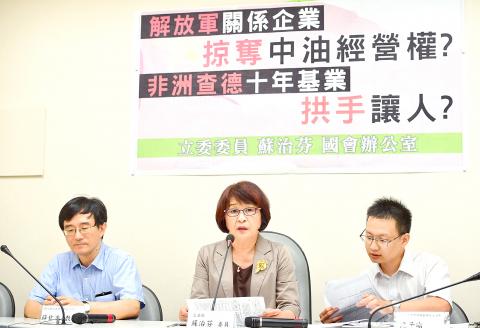State-run oil refiner CPC Corp, Taiwan (CPC) last year sold half of its stake in an oil exploration project in Chad to CEFC China Energy Co, potentially giving the venture to the Chinese conglomerate, which allegedly has Chinese People’s Liberation Army (PLA) connections, a Democratic Progressive Party (DPP) lawmaker said yesterday.
CPC has cooperated with the Chadian government in developing an oil field since 2006, with CPC holding a 70 percent stake in the project and the government holding the remaining 30 percent.
CPC in 2011 announced that it had made a crude oil discovery and would begin drilling, a milestone for Taiwan’s oil supply industry, but in 2015 the company announced that it would sell half of its share to CEFC, a deal that was completed last year.

Photo: Peter Lo, Taipei Times
During a news conference at Legislative Yuan, DPP Legislator Su Chih-feng (蘇治芬) questioned if the CPC has authority over the now-joint venture, especially when CEFC is allegedly connected with PLA officials.
Former CPC Chad mining office director Chen Tzu-yu (陳子瑜) said although CEFC had promised that it would not challenge the CPC’s managing authority, it nevertheless put six employees in the CPC office, which was staffed by fewer than 20 Taiwanese.
A CEFC employee also holds the critical position of production vice president, which would allow the Chinese company to plan and direct the production process when the oil field begins production, Chen said, warning against the CEFC’s potential to monopolize the venture.
CEFC’s top management allegedly has a background in the PLA, casting a shadow over its partnership with CPC, Chen said.
CEFC chairman Ye Jianming (葉簡明) and executive director Chan Chauto (陳秋途) were high-ranking Chinese Association for International Friendly Contact officials, Chen said.
Notable association member Xin Qi (辛旗), a PLA major general involved in China’s Taiwan affairs, is rumored to be behind Taiwan’s high-school curriculum guidelines controversy, Chen said.
The China Academy of Culture Ltd, a cultural organization established by CEFC, has organized several cross-strait exchange events with a “united front” aim, Chen said.
National Chengchi University professor Hsueh Hua-yuan (薛化元) warned against a possible hostile takeover by CEFC.
“Market economy is only applicable to nations where rules of the market economy are observed, but [CPC] has to change its mindset when dealing with people who do not observe the rules,” Hsueh said.
However, CPC Exploration and Production Business Division chief executive officer Michael Chang (張敏) said that CPC is in control of the Chadian project.
CPC holds the positions of general manager, operational vice president and technical vice president, while the Chadian government has promised to stay neutral in a potential management dispute, Chang said.
CPC has invested more than US$200 million in the project and CEFC has spent US$114 million purchasing CPC shares, the company said.
The shares were sold because CEFC offered the best terms against five Canadian and Malaysian bidders, and because the company decided to hedge the risk of development failure due to concerns about technical problems, local politics and oil price fluctuations, Chang said.
The oil field has a reserve of about 34.74 million barrels and could begin production by 2020.
CPC is to invest another US$473 million in developing the oilfield, with an estimated return of 15 percent.

Taipei has once again made it to the top 100 in Oxford Economics’ Global Cities Index 2025 report, moving up five places from last year to 60. The annual index, which was published last month, evaluated 1,000 of the most populated metropolises based on five indices — economics, human capital, quality of life, environment and governance. New York maintained its top spot this year, placing first in the economics index thanks to the strength of its vibrant financial industry and economic stability. Taipei ranked 263rd in economics, 44th in human capital, 15th in quality of life, 284th for environment and 75th in governance,

The Sports Administration yesterday demanded an apology from the national table tennis association for barring 17-year-old Yeh Yi-tian (葉伊恬) from competing in the upcoming World Table Tennis (WTT) United States Smash tournament in Las Vegas this July. The sports agency said in a statement that the Chinese Taipei Table Tennis Association (CTTTA) must explain to the public why it withdrew Yeh from the WTT tournament in Las Vegas. The sports agency said it contacted the association to express its disapproval of the decision-making process after receiving a complaint from Yeh’s coach, Chuang

Control Yuan Secretary-General Lee Chun-yi (李俊俋) tendered his resignation last night, admitting that he had misused a government vehicle, as reported by media. His resignation was immediately accepted by the Control Yuan. In a statement explaining why he had resigned, Lee apologized for using a Control Yuan vehicle to transport his dog to a pet grooming salon on May 20. The issue first came to light late last month, when TVBS News reported that Lee had instructed his driver to take the dog to the salon. The news channel broadcast photos that it said were taken by an unnamed whistle-blower, which purportedly showed the

A former officer in China’s People’s Liberation Army (PLA) who witnessed the aftermath of the 1989 Tiananmen Square massacre has warned that Taiwan could face a similar fate if China attempts to unify the country by force. Li Xiaoming (李曉明), who was deployed to Beijing as a junior officer during the crackdown, said Taiwanese people should study the massacre carefully, because it offers a glimpse of what Beijing is willing to do to suppress dissent. “What happened in Tiananmen Square could happen in Taiwan too,” Li told CNA in a May 22 interview, ahead of the massacre’s 36th anniversary. “If Taiwanese students or